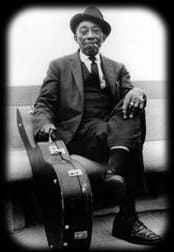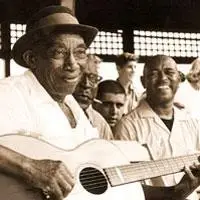MISSISSIPPI JOHN HURT
 When the Folk/Blues revival of the early 60’s brought old Blues players out of obscurity and put them on the world stage, nobody’s obscurity was deeper than Mississippi John Hurt’s. He had a superb fingerpicking style and a vast repertiore of songs, but John turned down the chance to join a travelling show when he was a youth because his heart was close to home and family, and the security they offered. John worked as a farm-hand around Avalon, Miss. until he was almost 70 years old and in all that time the biggest crowd he played for was probably less than a hundred.
When the Folk/Blues revival of the early 60’s brought old Blues players out of obscurity and put them on the world stage, nobody’s obscurity was deeper than Mississippi John Hurt’s. He had a superb fingerpicking style and a vast repertiore of songs, but John turned down the chance to join a travelling show when he was a youth because his heart was close to home and family, and the security they offered. John worked as a farm-hand around Avalon, Miss. until he was almost 70 years old and in all that time the biggest crowd he played for was probably less than a hundred.
This was because John was a genial, modest man who looked on music as his hobby. He had a gentle, quiet style that didn’t lend itself to loud dances and festivities; an understated performer with a delicate guitar style more reminiscent of Piedmont than the Delta, and soft and lilting but somewhat plain voice. I suspect his ideal venue was probably his own back porch where he would entertain his friends, or maybe a small party. John’s repertoire included ragtime, folk songs, spirituals and ballads as well as Blues songs, both standards and original material.
 In 1892, John Smith Hurt was born in Carroll County Mississippi and in such an isolated community, music was usually self-made, so he started playing guitar when he was ten. He worked as a farm labourer as soon as he was big enough, but around 1916 he went to work on the railroad for a short spell, which exposed him to some different musical styles and some new songs. Back in Avalon he teamed up with Willie Namour, a white fiddle player. A scout from Okeh records came to see Namour in 1927, after he had won a fiddle contest and as a result of seeing the pair play, he took John to a studio in Memphis where they recorded a few tracks. Only two were issued at the time, although John went to New York the following year to record some more. These original tracks show the charm of John’s work. With it’s jaunty, melodic chord work, intricate finger-picking and his warm friendly voice, it is a truly unique interpretation of the Blues.
In 1892, John Smith Hurt was born in Carroll County Mississippi and in such an isolated community, music was usually self-made, so he started playing guitar when he was ten. He worked as a farm labourer as soon as he was big enough, but around 1916 he went to work on the railroad for a short spell, which exposed him to some different musical styles and some new songs. Back in Avalon he teamed up with Willie Namour, a white fiddle player. A scout from Okeh records came to see Namour in 1927, after he had won a fiddle contest and as a result of seeing the pair play, he took John to a studio in Memphis where they recorded a few tracks. Only two were issued at the time, although John went to New York the following year to record some more. These original tracks show the charm of John’s work. With it’s jaunty, melodic chord work, intricate finger-picking and his warm friendly voice, it is a truly unique interpretation of the Blues.
Avalon Blues helped to trace John’s whereabouts;
After the ‘Crash of 29’ and the resulting economic slump, there were to be no more recording opportunities for John for 35 years. One of the songs he recorded for Okeh in 1928 was ‘Avalon Blues’ and the lyric, ‘my home town’ was the clue that musicologist Tom Hoskins followed when he decided to try to contact the old man in 1963. Hoskins must have been astounded to find the 70 year old John’s talents perfectly intact, and a series of concerts and recording sessions were arranged. He cut an album, ‘Avalon Blues’ and appeared at the 1963 and ’64 Newport Folk Festivals, displaying a style that had not changed much since the 20’s.
This fine example of Black American heritage and culture was welcomed on the folk revival scene, centred on coffee houses and university campuses, but a wider public was turning on to the Blues and John toured the country, sometimes with another ‘rediscovered’ talent, Skip James. Genial John seemed bemused that his music was suddenly popular and highly regarded, and he showed none of the bitterness of some of his contemporaries whose work had also been ignored for so long. In the brief years of John’s renaissance he recorded many songs for the Library of Congress and the Vanguard record label. He sang many Blues standards and covers of other people’s work as well as his own songs, but that was probably only a fraction of his repertoire.